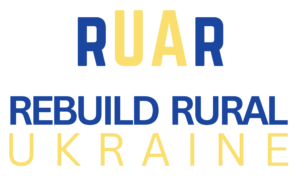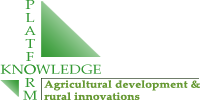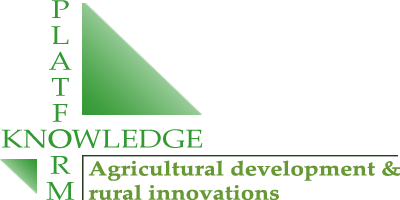Доступ до землі малих виробників сімейного типу і фермерських господарств в Україні
 ГО АРСІ спільно з АФЗУ при підтримці проєкту “rUAr: Rebuild Rural Ukraine” обговорили проблеми динаміки змін доступу до землі малих виробників сімейного типу і фермерських господарств в Україні в умовах розширення ринку купівлі-продажу землі у період широкомасштабної війни рф проти України.
ГО АРСІ спільно з АФЗУ при підтримці проєкту “rUAr: Rebuild Rural Ukraine” обговорили проблеми динаміки змін доступу до землі малих виробників сімейного типу і фермерських господарств в Україні в умовах розширення ринку купівлі-продажу землі у період широкомасштабної війни рф проти України.
Українське громадянське суспільство підтримує ринок сільськогосподарських земель, але виступає за справедливий підхід до продажу та оренди землі. Учасники зустрічі наголосили, що поточна модель земельного ринку в Україні не забезпечує справедливого доступу до землі для малих або нових фермерів, місцевих мешканців, а також створює значні соціальні, економічні та екологічні ризики.
Ключові висновки обговорення:
Існує нагальна необхідність зміни ідеології формування державної аграрної політики – перенесення акценту з збільшення експорту комерційних культур на користь кількох корпорацій на розвиток сталих продовольчих систем та багатофункціональний розвиток сільських територій. Земельна реформа та земельний ринок мають стати інструментами досягнення таких цілей, як розвиток агропродовольчої системи на основі сімейного фермерства, сприяння сталим місцевим продовольчим системам, зменшення безробіття, боротьба з бідністю в сільських районах та підвищення біорізноманіття.
Пропозиції щодо захисту інтересів малих виробників:
Для пом’якшення та припинення економічного виключення селян з земельних ринків учасники запропонували тимчасове припинення продажу сільськогосподарських земель до закінчення війни та протягом кількох років після неї. Після відновлення земельних угод мають бути впроваджені механізми державної фінансової підтримки для допомоги індивідуальним фермерам, а також внутрішньо переміщеним особам з окупованих територій та зон бойових дій у придбанні сільськогосподарських земель.
Також необхідно розробити ефективні гарантії проти надмірної концентрації землі, оскільки поточний ліміт у 10 000 гектарів при придбанні землі одним суб’єктом не може слугувати такою гарантією.
Роль громадянського суспільства:
Учасники наголосили на критичній важливості активнішого залучення громадянського суспільства, включаючи фермерів, малих господарів, дрібних виробників, споживачів та екологічні організації, до розробки урядових політик у сільськогосподарському секторі та земельних відносинах. Це забезпечило б кращу реалізацію їх прав, особливо земельних, а також могло б допомогти запобігти соціальним конфліктам, що виникають через земельні питання.
Обговорення було проінформоване результатами Міжнародного семінару “Доступ до землі та агроекологія: досвід ЄС для України”, що відбувся 18 березня 2025 року в Інституті економіки та прогнозування НАН України, який зібрав українських та міжнародних експертів, науковців, фермерів, представників громад та політиків.
Дослідження фінансовані в рамках програми “Long-term program of support of the Ukrainian research teams at the Polish Academy of Sciences carried out in collaboration with the U.S. National Academy of Sciences with the financial support of external partners” (проєкт “rUAr: Rebuild Rural Ukraine”).
Олексій ФРАЄР
Голова ГО “Платформа знань – аграрний розвиток та сільські інновації”
Access to Land for Small-Scale Family-Type Producers and Farming Households in Ukraine
The NGO “Knowledge Platform – Agricultural Development and Rural Innovations” (ADRI), jointly with the Association of Farmers and Private Landowners of Ukraine (AFZU), with support from the “rUAr: Rebuild Rural Ukraine” project, discussed the dynamics of changes in land access for small-scale family-type producers and farming households in Ukraine in the context of the expanding land sale and purchase market during the full-scale war against Ukraine.
Ukrainian civil society supports the agricultural land market but advocates for an equitable approach to land sale and lease. Meeting participants emphasized that the current land market model in Ukraine does not ensure equitable land access for small-scale or new farmers and local residents, while also creating significant social, economic, and environmental risks.
Key Discussion Conclusions:
There is an urgent need to change the ideology underpinning state agricultural policy formation – shifting the focus from increasing commercial crop exports to benefit a few corporations toward developing sustainable food systems and multifunctional rural development. Land reform and the land market must become instruments for achieving such objectives as developing an agri-food system based on family farming, promoting sustainable local food systems, reducing unemployment, combating poverty in rural areas, and enhancing biodiversity.
Proposals for Protecting Small Producer Interests:
To mitigate and halt the economic exclusion of peasants from land markets, participants proposed a temporary suspension of agricultural land sales until the end of the war and for several years thereafter. Following the resumption of land transactions, state financial support mechanisms must be implemented to assist individual farmers, as well as internally displaced persons from occupied territories and combat zones, in acquiring agricultural land.
Effective safeguards against excessive land concentration must also be developed, as the current limit of 10,000 hectares for land acquisition by a single entity cannot serve as such a guarantee.
The Role of Civil Society:
Participants emphasized the critical importance of more actively engaging civil society, including farmers, smallholders, small-scale producers, consumers, and environmental organizations, in developing government policies in the agricultural sector and land relations. This would ensure better realization of their rights, particularly land rights, and could help prevent social conflicts arising from land issues.
The discussion was informed by the outcomes of the International Seminar “Land Access and Agroecology: EU Experience for Ukraine,” held on March 18, 2025, at the Institute for Economics and Forecasting of the National Academy of Sciences of Ukraine, which brought together Ukrainian and international experts, researchers, farmers, community representatives, and policymakers.
This research has been financed under the “Long-term program of support of the Ukrainian research teams at the Polish Academy of Sciences carried out in collaboration with the U.S. National Academy of Sciences with the financial support of external partners” (project “rUAr: Rebuild Rural Ukraine”).
Oleksii FRAIER
Head, NGO “Knowledge Platform – Agricultural Development and Rural Innovations”

